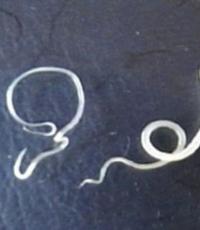Intimate hygiene of expectant mothers: important nuances. Daily sanitary pads: harm and benefit Can pregnant women wear pads
In pursuit of cleanliness and comfort, humanity invents more and more new devices. Panty liners once firmly entered our lives and found approval among many women. This is a pretty handy hygiene item that can help you out in any emergency situations. The advantage of this tool is a small and inconspicuous form, which makes it possible to use it every day. Daily pads, harm or benefit? Despite all positive properties, in scientific circles, disputes about whether panty liners are harmful to women's health do not subside.
Purpose of use
The need to purchase pads or alternative hygiene items is due to nature female body. But, ? Everydays are considered a product to provide additional comfort at any time. From funds for critical days they are distinguished by the composition, size and thickness. The absorption rate is also significantly lower.
Small and thin products for every day are completely invisible under clothes. Some models can be matched to the tone and type of underwear (thongs, tango, etc.). Most popular products:
In spite of possible harm, panty liners have become a real salvation in certain situations:
- when a woman is prone to intense secretions of sexual secretions constantly or at different periods of the cycle (during ovulation, before menstruation, etc.) and this is not associated with gynecological diseases, inflammatory processes;
- when it is not possible to change underwear: during a long trip without amenities, at a party, at work, etc. - daily use with wet wipes for intimate hygiene can be a complete replacement for water procedures;
- when there is no need to use large pads - with slight discharge at the end or at the very beginning of the menstrual cycle;
- during local treatment with vaginal tablets or suppositories, which have the properties of dissolving and flowing out;
- during pregnancy, when the amount of discharge increases;
- during thrush, when a woman suffers from abundant white curdled discharge;
- when there is a mild degree of urinary incontinence (for example, after childbirth, in old age or with inflammatory diseases of the genitourinary system).
The decision to use hygiene panty liners you always take it yourself, based on your own preferences regarding cleanliness, body characteristics and, of course, lifestyle. Of course, you should not spend extra money if you do not have any problems with discharge, and daily showering is enough to maintain hygiene. If water procedures are not salvation, you should be aware of possible consequences permanent wear these products.
Potential negative consequences
Among the harmful effects of wearing panty liners, there are various reactions of the female body, which are mainly associated with individual characteristics, predispositions to various diseases, as well as how accurately the rules of use were followed.
These reactions include:
- Changes in the microflora of the vagina, which may be accompanied by an increased amount of discharge and be associated, first of all, with the activity of harmful microorganisms - this situation is the result of a rare change of products;
- Thrush from panty liners - it occurs when a change in the microflora of the vagina coincides with reduced immunity or dysbacteriosis. Such a disease is one of the most discussed problems that are attributed to the use of this hygiene product, why they are among some people and are considered very "harmful";
- - can be as a reaction to low-quality materials or a "greenhouse effect", which is a consequence of the use of non-breathable fabric;
- Allergy is a purely individual consequence for women, which may be accompanied by inflammation of the mucous membrane, swelling of the skin in the genital area, the appearance of red spots or a rash in this area. Most often, an allergic reaction occurs to dyes or flavors used in the manufacture of pads.
The appearance of any of the listed consequences should be the reason for the rejection of the selected product, and it is better to stop using it for a while.
It is advisable to immediately consult a doctor with similar problems in order to exclude infectious diseases that have similar symptoms.
When establishing an allergy to a particular component of the pad, you should try to avoid contact with the skin. It is not necessary to completely abandon this item of personal hygiene.
You can reduce the likelihood of any of the above negative reactions by following the usual recommendations for use.
It is not difficult to minimize the harm of panty liners, the main thing is to follow the quite usual rules for their use. When wondering if it is harmful to wear them every day, you need to remember that there are many varieties, models, companies, materials and everything else that affects the development, so to speak. side effects.
There is no need to argue with the fact that the daily creates a favorable environment for the reproduction of pathogenic microorganisms. However, it is impossible not to notice that it is also created by ordinary underwear made of synthetic (non-breathable) materials. A number of recommendations on how often to change products and how to choose them will help to avoid this situation, as well as the consequences listed above:
- Ideally, use a new hygiene product after 2-3 hours. You can stretch this time up to 4, but then the risk of bacterial activity increases.
- Give your preference to models that do not contain dyes, fragrances and parabens - this reduces the likelihood of an allergic reaction or skin irritation.
- Better made on the basis of hypoallergenic cotton - this material allows the skin to breathe.
- A good sign of the daily is not a solid, but a dotted adhesive line. This is due to the fact that solid can provide poor air access to the skin and cause a "greenhouse effect". As a result, increased sweating and the likelihood of irritation.
- A wonderful option - products in individual packages. They have a high degree of sterility.
- Choose hygiene products with an up-to-date expiration date - it is not in vain indicated on such products!
You can choose the right product for you only by trying different brands. Pay attention to how your skin reacts to each type of product and don't experiment with how long you wear it - this practice can affect your vaginal flora.
Intimate hygiene is called care for the external genitalia in women - this is the vestibule of the vagina, the clitoris and labia; hygiene procedures also extend to the exit from the rectum and somehow capture the vagina; these circumstances determine the fact of the appearance on the market of special cosmetics for intimate hygiene.
A bit of anatomy
The vagina of an adult woman is a musculo-fibrous tube lined with a mucous membrane. Its upper part covers the cervix, the lower part of the vagina ends in the vestibule. In the normal state, the mucous membranes of the walls of the vagina are in contact with each other, and the vagina does not gape, but on a transverse section it looks like a gap.
Normally, in the vagina of a healthy woman there is a small amount of whitish content with an acidic reaction. An acidic reaction (pH 4.0-4.5) is due to the presence of lactic acid in the vaginal discharge. The fact is that the surface cells of the epithelium of the vaginal mucosa contain a significant amount of a special substance - glycogen. Glycogen has two functions. On the one hand, it serves as a nutrient substrate for spermatozoa that have entered the vagina; on the other hand, glycogen is necessary for the vital activity of lactobacilli, which are an indispensable attribute of vaginal contents healthy woman. Glycogen undergoes enzymatic transformations into lactic acid, thereby creating an acidic environment and preventing the reproduction of other microorganisms, including pathogens.
During pregnancy, many changes occur throughout the body, including, of course, in the genital area. In the pelvic region, blood circulation is enhanced. Due to the thickening of the mucous membrane, loosening of the connective tissue and the growth of smooth muscles, the folding of the vaginal walls increases. The amount of discharge of the vaginal glands increases, the discharge becomes thick and becomes White color. The pH value of the vaginal contents shifts to the acid side up to 3.3 as a result of increased formation of lactic acid, which is due to an increase in the glycogen content in the vaginal epithelium. The change in pH protects the vagina from some infections, but the increased glycogen content is associated with an increased risk of growth of the yeast Candida albicans. Along with this, during pregnancy, there are also changes in the work of the immune - protective - system of the body. All this serves as predisposing factors for the penetration and activation of pathogens during pregnancy. In addition, if outside of pregnancy only a woman can suffer due to lack of hygiene, then during the bearing of a baby, it is also a fetus. All this makes the issues of intimate hygiene especially relevant for expectant mothers.
Rules and prohibitions
First of all, the following rules must be observed:
- You need to wash yourself with pre-washed hands, but not with a sponge or washcloth: the skin in the crotch area is delicate, it is easy to injure it.
- Water must be flowing. That is, if it is not possible to use water from the tap or from the shower, you should not wash yourself while sitting in a basin - you need to pour it on the area of the external genitalia.
- You need to wash warm water. Cold water can provoke an exacerbation of inflammatory diseases; moreover, too cold or too hot water can provoke a threat of termination of pregnancy.
- It should be washed from front to back in order to prevent the entry of microorganisms from the rectal area into the vagina.
- Only individual towels should be used, the water should be gently blotted.
- Tight synthetic underwear provokes the development of inflammatory diseases.
As in any rules, there are categorical prohibitions in the rules of intimate hygiene:
- You should not douche - introduce detergents into the vagina - without a doctor's prescription.
- You should not use any of these without a doctor's prescription. medicines by inserting them into the vagina. Some women practice this before visiting the gynecologist on the eve of taking a smear for analysis. Irregular, incorrect use of medicines will not solve the problem, but it can harm the baby. The results of the analysis will be doubtful, and you will have to repeat the study.
Means for intimate hygiene
To begin with, let's figure out how soap washes. The washing properties of soap are due to its emulsifying action. Soap dissolves sebum (fat) on the surface of the skin and releases adhering dirt. It happens like this. Anions formed in an aqueous solution of soap (negatively charged particles) are collected in aggregates and form a foam. Foam envelops fatty pollution. Fatty contaminants do not dissolve in water, but dissolve in the "core" of such anionic aggregates with the formation of an emulsion. The emulsion particles are carried away with the water. This is how fatty impurities are removed from the surface of the skin. The same applies to cosmetics for skin care, and synthetic detergents designed for washing fabrics. The more alkaline the soap solution is, the better it removes sebum, but at the same time dries the skin.
Antioxidants, plasticizers, stabilizers, dyes and fragrances are attributes of modern soap formulations. Plasticizers and partially antioxidants, as well as stabilizers, compensate for the defects of technology that has not changed since 1945. Variations of other additives, together with the technology, provide the soap with color, smell, shape, consistency, etc.
Antimicrobial, disinfectant, bactericidal and other similar additives give soap medicinal properties.
Of greatest interest is the massive use of so-called cosmetic additives. The division into technological and cosmetic additives is rather conditional. Perfumes not only give the soap a pleasant smell, but also partially increase the plastic properties, facilitating the technology of its production. Cosmetic additives, being mostly extracts medicinal plants, in some cases, perform technological functions, similar to fragrances.
It should be noted that the very fact of adding cosmetic additives to the composition of soap plays a greater role in promoting the product to the market, rather than improving the effect of soap on the skin.
More often, the introduction of new cosmetic additives is used by the manufacturer to declare certain medicinal properties inherent in this additive, although in fact the content of the additive in the soap can be negligible, that is, the properties of the additives are transferred to the soap itself.
The introduction of impurities such as crushed leaves is also of dubious value. Of course, such soap looks extravagant, but all extraneous inclusions (i.e., non-soap substances, unevenly distributed in the volume of a piece) are ballast for soap and worsen its consumer properties. The consumption of a piece during washing will increase, as part of the soap will be used to “encapsulate” and remove leaves from the washing area. To share healing properties there is practically nothing left of crushed leaves or grains.
A softening effect can be achieved by introducing glycerin into the solid soap formula. The effect of glycerin is known to most women, you can always read about the presence of this supplement on the package. The use of glycerin soap for intimate hygiene is not contraindicated during pregnancy.
However, it should be noted that soap with vegetable and some animal additives always dries the skin less. The main mechanism of action of cosmetic additives is that the free fatty acids contained in any natural additive easily react with the alkali found in soap and weaken its irritating and “drying” effect on the skin. Thus, fatty acids alleviate the main disadvantage of fatty soaps. The action of the additive itself (calendula, celandine, etc.) does not play a big role in creating the healing properties of soap, while the fragrances and dyes added to the soap can cause an allergic reaction in the expectant mother, which will also cause an allergic predisposition in the baby.
Therefore, if during the period of bearing a baby you decide to change the soap that you used before pregnancy, then choose a soap with a minimum amount of additives or stay true to the old hygiene product.
For intimate hygiene, ordinary solid soap, liquid soap or special intimate hygiene products can be used.
The optimal fatty soap formulation includes 75-85% beef tallow and 25-15% coconut oil. Deviations in any direction lead to a deterioration in properties: soap changes not only appearance- the mechanical strength of the piece decreases, its cracking increases when used, the washing effect also decreases, and the consumption of soap increases. If you read what is written on the package, it is easy to see that the soap contains sodium and potassium salts of higher carboxylic acids. Moreover, the composition of solid soap includes sodium salts of higher carboxylic acids, and the main component liquid soap- potassium salts of organic acids. Under the influence of water from soap, an alkali and a weak acid are formed, a slightly alkaline environment is formed on the skin, while the alkalinity can be from 7 to 9.
Special means for intimate hygiene differ from other hygiene products in that they maintain the acidic environment of the skin, their pH is 5.5. This allows the skin to retain normal moisture. This property of intimate hygiene products helps to maintain an acidic reaction in the vagina, thereby preventing the occurrence of dysbiosis. However, I would like to reiterate that it is normal detergent should not in large quantities enter the vagina. The announced supplements (chamomile extracts, string) are also of an auxiliary nature.
Intimate hygiene products tend to contain fewer fragrances, fragrances, etc. This is important: strongly smelling and bright hygiene products should be avoided during pregnancy, as they are potentially allergenic.
Another important part of intimate hygiene is daily pads. With regard to these products, I would like to say the following: if they do not cause you discomfort or allergic rashes, then you can safely use these relatively new hygiene products. This applies to both regular and scented pads.
From intimate deodorant during pregnancy, it is better to refuse, especially if you have not used it before, but wipes for intimate hygiene, impregnated with a special lotion, should be used only in cases where it is not possible to take a shower.
Let us remind you once again: if during pregnancy you have any suspicious discharge, rashes on the skin of the genital organs, do not try to solve the problem with new hygiene products, but consult a doctor.
Women's pads are divided into those used during menstruation and those used daily. During pregnancy, the need for the first disappears, but the second is given more importance.
Often during pregnancy, women increase the amount of discharge. The reason for this is changes in the hormonal background of a woman. Increases the work of the hormone progesterone, which performs protective function for the course of pregnancy. In the first weeks, the discharge is rather viscous, viscous and opaque. A couple of weeks after fertilization, a small amount is possible dark discharge, which may be a sign of implantation, but in any case, the new nature of the discharge must be reported to the doctor who is watching you.
Allocations can also be in late pregnancy. This may be a mucus plug that indicates the imminent onset of labor. The mucus plug can easily come out both in one go and in a few days. Usually it resembles mucus with blood streaks contained in it.
Besides, Various types secretions may indicate various diseases, which means that the patient should inform her doctor about everything that worries. This will help at various times to avoid abortion, thrush or sexually transmitted diseases.

All of the above clearly indicates the need to use panty liners.
They not only keep women's underwear clean, but also help to more clearly imagine the type and color of discharge. The ideal option gaskets can become always platinum. At later dates, always platinum can be used to distinguish between discharge of water from discharge or involuntary urination.
How to care for the genitals of a pregnant woman?
A feature of the genital organs of a woman is that they are characterized by a special microflora that protects their surface from the reproduction of harmful or conditionally pathogenic microflora. The normal microflora of the vagina is mainly represented by lactobacilli, which create an acidic environment in their habitat. And conditionally pathogenic microflora loves an alkaline environment. If a woman constantly washes her genitals with soap, then this can destroy the acidic environment of the vagina and cause increased reproduction of pathogens. This condition, when there are more "harmful" bacteria than "useful" ones, is called vaginal dysbacteriosis, or vaginosis. At the same time, discharge with a peculiar smell of fish appears. This is not a disease yet, but under adverse conditions (for example, with a cold), an inflammatory process can begin in the vaginal wall. That is why the intimate hygiene of a pregnant woman should be especially careful.
Intimate hygiene of a pregnant woman should be carried out according to the following rules:
You can use special wipes, pads, soap and gel;
During washing, the flow of water and hand movements should be directed from front to back, and not vice versa, so as not to infect the genitals from the anus;
Wipe the genitals with a clean soft individual towel;
Even at the very beginning of pregnancy, thong panties should not be worn - they injure the mucous membrane of the external genital organs and contribute to the penetration of infection into them.
What are the means for personal hygiene of a pregnant woman
For the personal hygiene of women, wipes, panty liners, gels and soaps for intimate hygiene are produced. Napkins should be used only in emergency cases, when it is not possible to take a shower, since they are impregnated with a special lotion and contain an antiseptic, they cannot be used all the time. Panty liners for pregnant women should have a straight, anatomical (tapering in the middle) shape. You need to change them up to 5 times a day. The Italian pharmaceutical company Rottafarm has developed a special blue line of feminine hygiene products based on herbal extracts, designed for use during pregnancy.
Soaps and gels for intimate care contain additives in the form of antibacterial and anti-inflammatory substances that do not irritate the surface of the genital organs. However, pregnant women can only use them for skin treatment.
Of great importance is the underwear of a pregnant woman. It is better if it is made from natural fabrics (for example, cotton). You need to change your underwear every day.
Personal hygiene of a pregnant woman is something that must be done under any circumstances, because the reward for this work will be a healthy baby.
in the bustle modern world and a busy work schedule, it is difficult to imagine a business woman who does not pay attention to her hygiene. For the convenience of women and to maintain a feeling of freshness and comfort throughout the working day, sanitary napkins have been created.
Why do you need panty liners?
Panty liners are not a necessity, but rather a comfort item for women who care about their hygiene. These products differ from menstrual pads in their composition, size and thickness, as well as the level of absorption of secretions. Panty liners are extremely thin, almost weightless, ideally repeat female forms. In addition, you can purchase products for any color and type of underwear - tango, thongs, week-long panties. "Daily" are indispensable for women who:
- Thrush;
- Abundant mucous discharge from the vagina, not caused by inflammation and disease;
- Minor urinary incontinence, weak urinary sphincter (there is a small amount of urine when sneezing, laughing);
- The last days of menstruation, when the discharge is light, smearing and there is no need to use a regular sanitary napkin.
Panty liners provide comfort for women who use any type of vaginal suppositories and are worried that the medicine will leak onto their underwear.
How to use daily?
Despite the convenience and comfort that panty liners give to women, it is still not worth using these products all the time. The thing is that most pads for daily use are impregnated with flavoring substances that perfectly mask the smell of the vagina, and sooner or later they all cause a strong allergic reaction in a woman.
Just like regular sanitary pads, sanitary pads have their own level of absorption, and vaginal secretions provide an ideal breeding ground for pathogenic bacteria and the development of inflammation. Ideally, daily wear should be changed once every 2-3 hours and used only when necessary, that is, everyday wear is undesirable.
Is it safe to use daily?
Gynecologists often hear this question from those women who are responsible for their reproductive health and also want to keep fresh and clean after a shower throughout the day. If a pad for daily use is used infrequently, then this will not bring harm to the health of the genital organs, however, regular use of daily pads is fraught with the development of an allergic reaction and vaginitis. The downside of the daily is increased sweating of the skin of the genitals due to poor air access when wearing them, respectively, increases the risk of developing thrush, vaginal dysbacteriosis and various irritations.
Is it possible to be allergic to panty liners and what are its symptoms?

An allergic reaction to the use of panty liners is possible if the product contains dyes and fragrances. With the development of allergies, a woman will experience the following symptoms:
- Redness and swelling of the external genitalia;
- Itching of the genitals;
- Burning when urinating;
- Pain during sexual intercourse.
Attention! Listed clinical symptoms can signal inflammatory infections and sexually transmitted diseases, therefore, in this situation, a consultation with a gynecologist and testing is mandatory.
Panty liners: which is better to choose?
Panty liners have an adhesive on the back that "sticks" or fixes the product to the underwear. It is best to choose pads that have a dotted line on the back of the adhesive, products with glue all over the surface cause overheating of the genitals and increase the risk of developing allergies and vaginosis. What better firm to choose - it already depends on the wishes and financial capabilities of the woman herself, the most popular dailies are Diskrit, Koteks.
Irina Levchenko, obstetrician-gynecologist, specially for website





